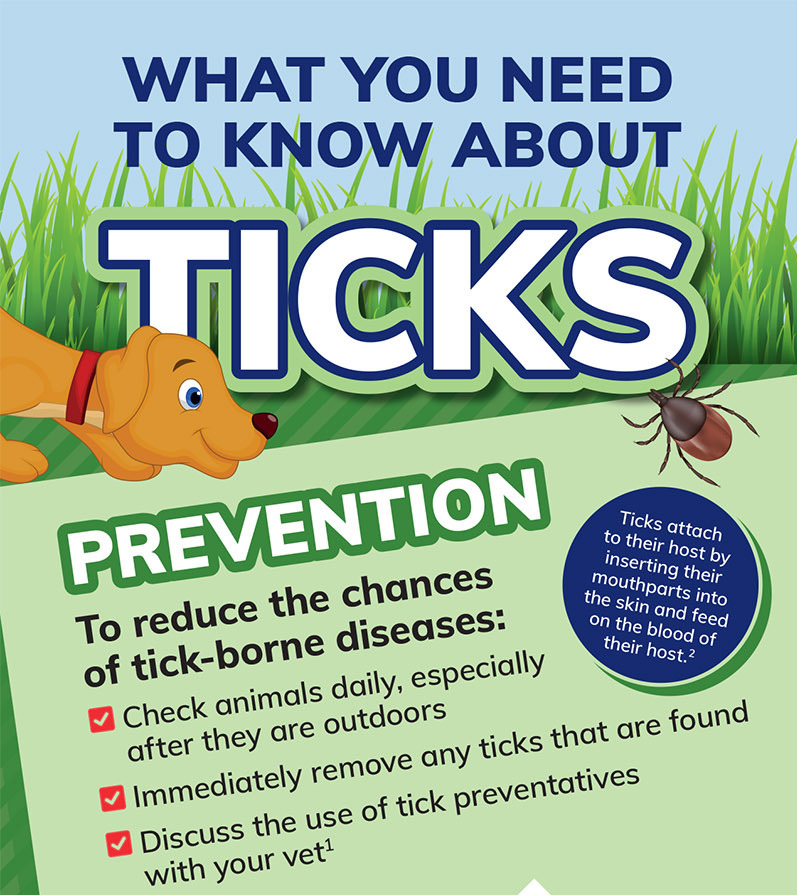More than an itchy nuisance, fleas and ticks are blood-sucking, disease-spreading pests that can cause a variety of problems for cats and dogs.

Fleas can cause skin irritation, anemia, and allergic reactions, while ticks can transmit serious diseases such as Lyme disease, Rocky Mountain spotted fever, and ehrlichiosis.
In this article, we’re going to look at the not-so-fun facts about fleas and ticks and introduce you to several prevention methods.
Not-So-Fun Flea Facts
Fleas have been around for millions of years, causing itchy misery and spreading diseases like tapeworms and life-threatening bacteria and viruses affecting animals and people.
For example, fleas spread the bacteria that causes The Plague, a disease that killed thousands in Europe in the Dark Ages and is still found today in places as near as Eastern Oregon.
Although tiny and flightless, fleas can jump 7-13 inches and show no respect for property lines and door sills.

Female fleas can lay over 5,000 eggs in their lifetime and live up to 18 months.
A single pregnant flea can cause a population explosion of fleas on your pet and in your home.
Flea Bite Anemia
When cats get infested with fleas, they can get flea bite anemia due to losing so much blood. Those suckers (literally) drain so much blood that a cat’s body is unable to function normally.
Cats particularly susceptible to flea bite anemia include:
- kittens
- small cats
- elderly cats
- cats with weakened immune systems
- cats who have lost blood due to an injury
- cats who have recently undergone surgery and required a blood transfusion
Cat Scratch Fever
Fleas also cause cat scratch fever, a mild-to-severe bacterial infection that cats can pass along to humans. Humans can get cat scratch fever when a cat infected with Bartonella henselae (a bacteria cats contract when scratching or biting at infected fleas) bites or scratches a human or licks an open wound on a human’s skin.
Cat scratch fever (also called cat scratch disease) in humans is most prevalent in the southern part of the U.S. and most common among teenagers and children aged 5-9. However, anyone who owns or interacts with a cat is at risk of contracting the disease.
Signs of Flea Allergy in Dogs
Some dogs are allergic to flea saliva, a condition called flea allergy dermatitis. Some common symptoms include excessive scratching, hair loss, red and inflamed skin, hot spots, and the presence of flea dirt (tiny black specks resembling ground pepper) on your dog’s coat.
If you suspect your dog may dog is allergic to fleas, it is crucial to see your veterinarian immediately for treatment.
Ticks…A Growing Concern in the Pacific Northwest and Worldwide

Ticks are blood-sucking arachnids – not insects – and are implicated in the spread of a number of life-threatening diseases that affect humans and animals. They can harbor bacteria, viruses, and protozoal parasites, sometimes more than one at a time.
Slow-moving and unable to jump, they lay in wait on grass or leaves until their prey walks by, then grab on for the ride.
Ticks can transmit the bacteria that cause Lyme disease, Rocky Mountain Spotted Fever, anaplasmosis, and erlichiosis, to name a few.
Unfortunately, one of the many side effects of warmer temperatures is that ticks are increasing in abundance and geographical range throughout the world. Once a realm of warmer, humid southern areas of the US, ticks and tick-borne diseases have spread north and occur in all 50 states and Canada.
A similar phenomenon has occurred in Europe. Tick migration mostly occurs through the movement of animals upon which ticks feed. Small mammals can transport ticks short distances, but migrating deer and, especially, birds can carry the intrepid hitchhikers into new territories where they once did not exist.
Our Western Washington “Emerald Isle” has more ticks.
How to Prevent Fleas and Ticks
The best way to prevent fleas and ticks is to use a year-round flea and tick preventive.

We have amazing new parasite preventives that came out in the past two years. These preventives are better than anything you can buy over the counter. (They prevent ticks, too.)
Call Atlantic Veterinary Hospital at 206-323-4433 and ask about our flea and tick preventives.
There are a variety of preventives available, including oral medications, topical medications, and collars.
Oral Medications
Oral medications are typically given to your pet by mouth once a month. They work by killing fleas and ticks before they can attach to your pet. These medications are generally more effective than topical medications, but they can be more expensive.
We recommend the oral chews that have come on the market in the past two years. No more messy topical medication or stinky collar; just a tasty “treat” that safely and effectively prevents fleas and ticks from 30-90 days, depending on the product.
Topical Medications
Topical medications are generally applied to your pet’s back between the shoulder blades.

They work by killing the fleas and ticks that come into contact with your pet. Be sure to follow the instructions on the medication label carefully.
Collars
Collars work by releasing a slow-release insecticide that kills fleas and tick that come into contact with the collar.

Collars are less effective than topical or oral medications, but they are a good option for pets that don’t tolerate other preventives.
New Lab Tests Spot Ticks Quickly
In addition to preventives, new laboratory tests help us spot tick-borne diseases faster, sometimes before they even cause disease symptoms.
You know the 4DX lab test we recommend for your dog every year? Well, test #1 screens for heartworm disease, but #2-4 are screens for tick-borne illnesses – Lyme disease, erlichiosis, and anaplasmosis.
Hey ticks, we’re watching.
Better Lyme disease vaccines are now available for dogs traveling to Lyme disease endemic areas – the Midwest, Northeast, Mid-Atlantic, and Florida.
We recommend your dog begins the Lyme vaccine series 7-8 weeks prior to your trip back East, as well as using one of the newer tick prevention products.
Precautions to Take

In addition to using a flea and tick preventive, take these precautions to help prevent fleas and ticks from infesting your pet:
- Keep your pet’s yard free of weeds, brush, and tall grass, which can provide hiding places for fleas and ticks.
- Treat your yard with appropriate insecticides to eliminate fleas and ticks in the outdoor area.
- Create barriers that prevent wildlife from entering your yard and potentially introducing fleas and ticks.
- Avoid walking your pet in wooded areas.
- Do a daily tick inspection of yourself and your pet.
- Bathe your pet regularly with a veterinarian-approved flea and tick shampoo to provide an extra layer of protection.
- Wash your pet’s bedding and toys regularly.
- Treat your pet’s bedding with flea and tick spray.
- Brush your pet’s coat, which will help remove any existing fleas or ticks and will allow you to detect and address any issues promptly.
- Vacuum floors, carpets, and furniture regularly, paying special attention to areas where your pet sleeps. This can help remove flea eggs, larvae, and ticks.
- Schedule routine veterinary checkups and vaccinations. Vaccinations not only protect against common diseases but can also boost your pet’s immune system to better resist fleas and ticks.
What to Do If Your Pet Gets Fleas or Ticks
If your pet does get fleas or ticks, it is important to treat them promptly. First, consult with your veterinarian, who can prescribe a treatment that is safe for your pet and that will kill all of the fleas and ticks.
Additional Resources
- The American Kennel Club has a guide to flea and tick prevention.
- The Centers for Disease Control and Prevention has information on the diseases that can be transmitted by ticks.
- The National Pest Management Association has a list of licensed pest control professionals in your area.


